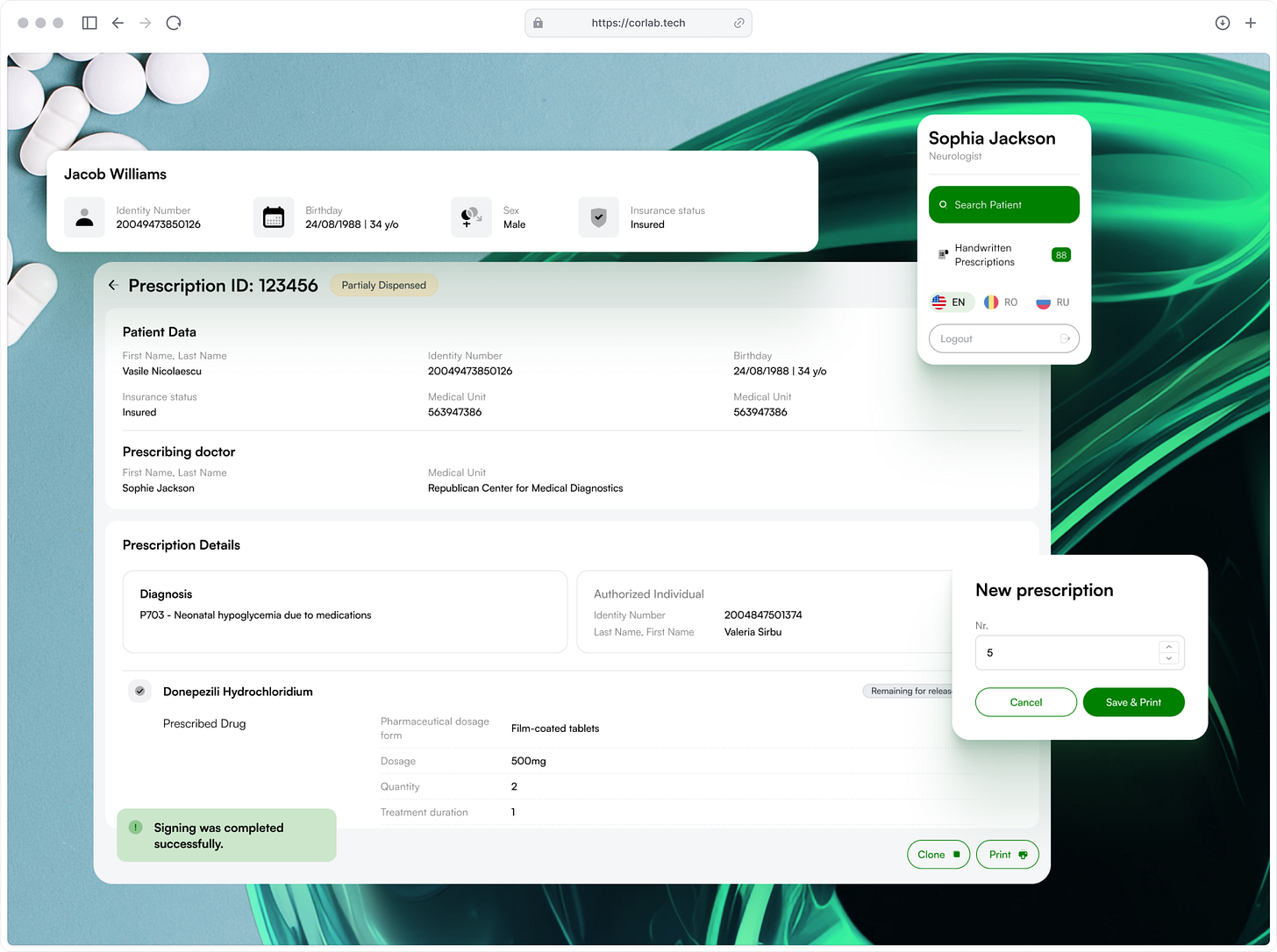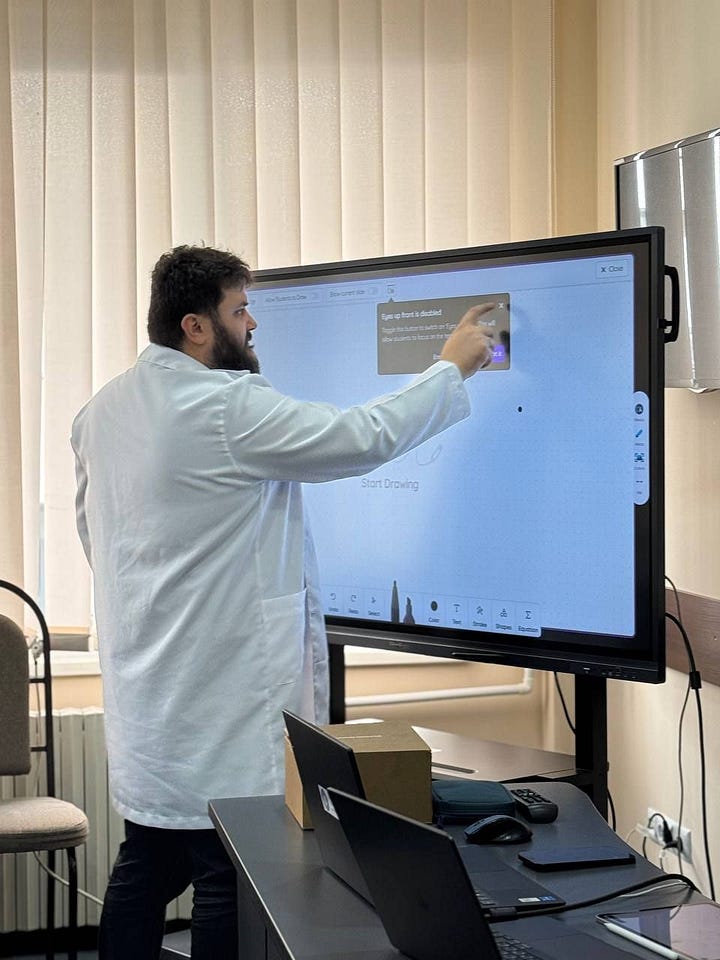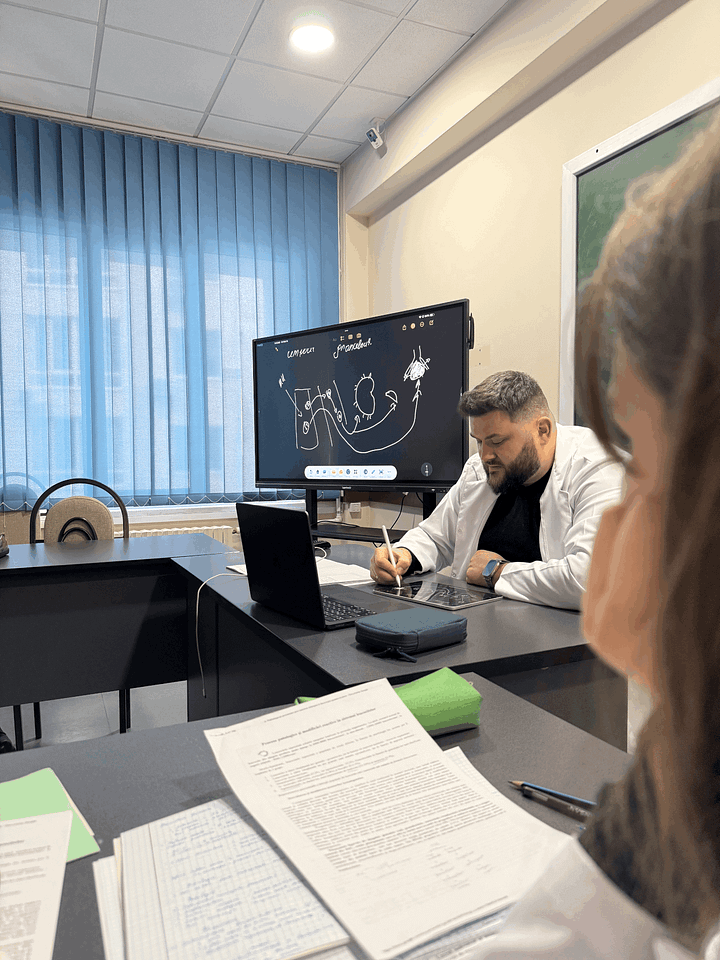Can Moldova swap scraps of paper for a digitized prescription across the country? Mihai Dascăl and his company Corlab did just that with eRețeta.
In his first years of being a student at Nicolae Testemițanu State University of Medicine and Pharmacy, Mihai Dascăl lived two lives: hospital shifts by day, coding at night. “My handwriting is awful, even I can’t read it,” he laughs. “So I built a website to type up my notes.”
That first site still lingers online. It was just a survival tool for exams, but something sparked. By 2011, between emergency shifts at National Prehospital Emergency Medical Center in Chișinău and hours behind a pharmacy counter, he was already blending medicine with code. After graduating from med school, he briefly wandered into neurosurgery.
A few years later, he founded CorLab Tech, a software company that builds digital products with a focus on healthcare and data-driven systems, where he now serves as CTO. The company now counts twenty people scattered across Moldova and beyond, all working remotely. Corlab joined the Moldova Innovation Technology Park (MITP) from the start, mainly for its single 7% tax, considered a major advantage. For Mihai Dascăl, it’s what gives Moldovan tech companies a fighting chance to stay competitive.
They’ve created the cancer registry for the Oncologic Hospital in Chișinău, and - their proudest project - changed how Moldovans receive their medicine, using an online system eRețeta.
“We picked health on purpose,” Mihai says simply. “It’s my weakness, wanting to help the medical system”. He talks about it with pride, but also weariness of someone who had seen the system “from both sides of the barricade”, as he calls it. Rushing to treat patients as a doctor and struggling to decipher prescriptions as a pharmacist.
So when the National Health Insurance Company announced a public tender for an electronic prescription system, he didn’t hesitate. “My master’s thesis was on e-prescriptions. I knew this was where I could really make a difference.”

“A day before launching, the system crashed.”
His team designed eRețeta, a platform where doctors can issue compensated prescriptions, pharmacists can see and dispense them and the insurance company can track everything in real time. eRețeta is currently used only for prescriptions that are partially covered by the state.
The night before launch, it almost collapsed. The national signing platform MSign - the gateway for logging in - suddenly crashed. “We were all in a room together, staring at the screens,” Mihai recalls. “We were supposed to go live the next morning, and suddenly, no one could even sign a prescription.”
For two tense hours, engineers from all sides scrambled to bring it back. Just before midnight, the lights turned green.
CorLab spent about seven to eleven months building eRețeta. To ensure it could survive in real life, they tested it with doctors and pharmacists in Hîncești, one of the largest districts in Moldova, before rolling it out nationwide. In April 2023, eRețeta went live.
290,000 prescriptions a month, now digital
Overnight, with only a few narrow exceptions, Moldova switched off paper prescriptions for compensated medication. And, to everyone’s astonishment, nothing crashed. Now the World Health Organization funds further development. “It’s not really maintenance, it’s active development,” Mihai says.

According to the National Health Insurance Company, the eRețeta platform is currently used in 1,400 contracted medical institutions and over 1,600 pharmacies nationwide. Each month, over 170,000 patients benefit from subsidized medicines, with nearly 290,000 electronic prescriptions issued and dispensed.
“Before eRețeta, prescribing and dispensing were manual and error-prone. Doctors couldn’t track a patient’s prescription history, pharmacists faced transcription errors, and reporting was often late and incomplete. Digitalization solved these problems and allowed real-time monitoring of public funds,” explains Silvia Munteanu, head of the National Health Insurance Company’s communication service. Dascăl notes that the shift also erased an invisible but massive cost for the government: nearly two million lei per year!
From pilot apps to a digital health system
This is just the beginning of a new era. The Moldovan Government has approved the National Program for Digitalization and Innovation in Health 2025–2030, which mandates the Ministry of Health and the National Health Insurance Company to develop an integrated digital ecosystem - from telemedicine to electronic health records - enabling clinicians to access patient histories across institutions and providing real-time oversight of public spending on medicines and services. That policy push explains why companies like CorLab are now pitching beyond single applications and toward interoperable national platforms.


It’s clear that for Mihai Dascăl, these platforms aren’t just code or contracts. To him, they’re the invisible rails the medical system runs on, and he wants them steady and reliable. There when people need them. Not abstract users, but real families. Families like his own, arriving at the hospital in the morning with a sick child, hoping the system will simply work.
This story was written by Patricia Mihaila of the Journo Birds, a media team that works withnonprofits to tell human-centered stories. This story was supported by UMAEF.


